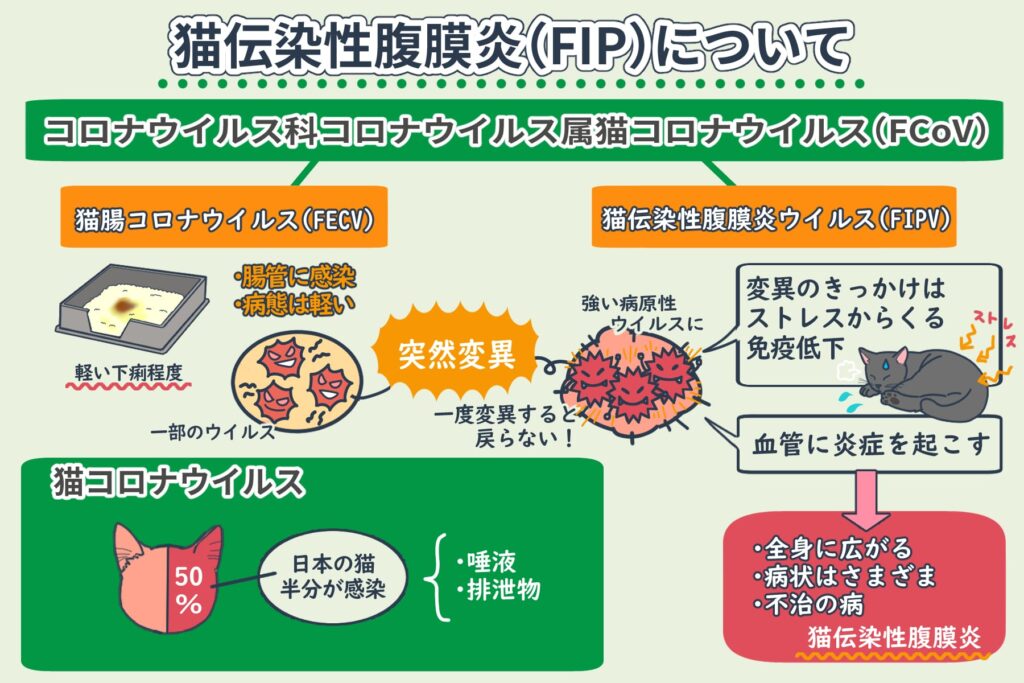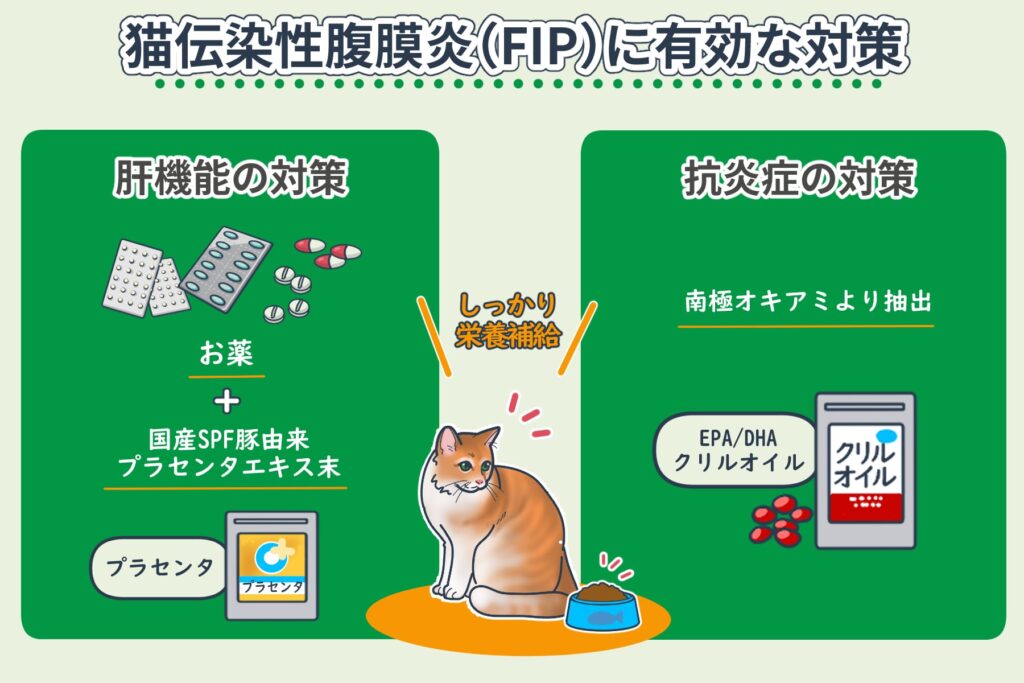・Feline Infectious Peritonitis (FIP) is a disease caused by the feline coronavirus (FCoV).
・In the initial stages of Feline Infectious Peritonitis (FIP) infection, symptoms such as decreased appetite, weight loss, fever, vomiting, and diarrhea, which can also occur in other diseases, may appear.
・Preventive measures for Feline Infectious Peritonitis (FIP) include immune support, liver function support, anti-inflammatory measures, and ensuring proper nutrition, which can potentially increase the chances of long-term survival.
目次
What is Feline Infectious Peritonitis (FIP)?

Feline coronavirus spreads easily as it is transmitted through saliva and excrement, and it is said that half of the cats in Japan are infected.
This feline coronavirus is classified into two types: feline enteric coronavirus (FECV) and feline infectious peritonitis virus (FIPV).
Feline enteric coronavirus (FECV) infects the intestines and can cause mild diarrhea, but sometimes there are no symptoms, and it generally results in relatively mild conditions.
However, if a portion of this virus mutates, it becomes the highly pathogenic feline infectious peritonitis virus (FIPV).
The trigger for this mutation is said to be a decrease in immunity due to stress.
Feline infectious peritonitis virus causes inflammation in blood vessels, leading to widespread inflammation throughout the body and a variety of symptoms.
Unfortunately, it is currently considered an incurable disease with no definitive treatment available.
Once the FIPV virus mutates, it does not revert to its original form.
Symptoms of Feline Infectious Peritonitis (FIP)
Feline infectious peritonitis virus is classified into two types: wet type (effusive) and dry type (non-effusive).
In the initial stages of both types, symptoms such as decreased appetite, weight loss, fever, vomiting, and diarrhea, which can also occur in other diseases, may appear.
Symptoms of the Wet Type (Effusive)
### Feline Infectious Peritonitis (FIP)
Among the two types of Feline Infectious Peritonitis (FIP), the wet type (effusive) is more commonly observed. Compared to the dry type (non-effusive), the wet type progresses more rapidly.
**Symptoms** include dehydration, anemia, abdominal distension due to ascites, breathing difficulties due to pleural effusion, and jaundice. The ascitic and pleural fluid withdrawn is typically yellow and viscous.
#### Symptoms of the Dry Type (Non-Effusive)
The dry type (non-effusive) of Feline Infectious Peritonitis (FIP) is characterized by a slower progression compared to the wet type (effusive).
The formation of granulomas in various organs, such as the kidneys, liver, brain, and eyes, is a distinctive feature. The symptoms vary depending on the affected organs, including renal impairment, liver dysfunction, and neurological symptoms (seizures, personality changes, abnormal behavior, walking difficulties, paralysis of bladder, facial nerve paralysis, etc.) if tumors develop in the brain.
### Causes of Feline Infectious Peritonitis (FIP)
The cause of Feline Infectious Peritonitis (FIP) is an infection with the feline coronavirus. The disease manifests when the feline coronavirus mutates into the “feline infectious peritonitis virus” for some reason.
#### Feline Coronavirus Transmission
Feline coronavirus infections are primarily transmitted through contact with other cats. The virus is present in the feces, urine, saliva, and nasal discharge of infected cats and can be transmitted through wounds or mutual grooming among cats.
#### Mutation of Feline Coronavirus
When a cat is infected with the feline coronavirus, it can mutate into the “feline infectious peritonitis (FIP) virus” under certain conditions, leading to the disease. Stress and a weakened immune system are thought to be triggers, making young cats (between six months and three years old) and older cats (over ten years old) more susceptible due to their lower immunity.
However, not all cats carrying the feline infectious peritonitis (FIP) virus will develop the disease. Variations in the pathogenicity of the virus and the immune state of the cat are believed to influence the likelihood of developing the disease.
### Diagnosis of Feline Infectious Peritonitis (FIP)
To determine if a cat is infected with the feline infectious peritonitis virus, a blood test can be conducted to check for the presence of viral antibodies. However, this test responds to both the feline infectious peritonitis virus (FIPV) and feline enteric coronavirus (FECV), so a high FCoV antibody titer does not definitively confirm FIP.
**When symptoms are present**
If a blood test reveals hyperproteinemia and the FIP antibody titer is positive, FIP is almost certainly diagnosed.
**When symptoms are absent**
If the FIP antibody titer is positive, a retest is conducted approximately one month later to determine the result. If the antibody titer has decreased, it is considered a temporary infection with the feline enteric coronavirus (FECV).
Therefore, the FIP antibody titer test can be used to screen for feline enteric coronavirus (FECV), as well as a supplement to the FIP diagnosis.
### Treatment of Feline Infectious Peritonitis (FIP)
[Content for treatment not provided in the original text]
Feline Infectious Peritonitis (FIP) has no cure.
Treatment is primarily for prolonging life.
In general, anti-inflammatory drugs (steroids) to reduce vasculitis are used in combination with interferon (antiviral) to boost immunity.
*Antibiotics may also be added to these treatments.
Additionally, in the case of the wet type (effusive form) where ascites or pleural effusion accumulates, the fluid may be drained depending on the degree of accumulation.
However, since nutrients are dissolved in the ascites or pleural effusion, the presence of this fluid can help maintain the body’s homeostasis (balance).
Therefore, excessive removal of the ascites or pleural effusion may lead to further weakening.
Different veterinarians have varied opinions on this matter, so it is recommended to have a thorough discussion to decide on the appropriate amount to drain.
To compensate for the nutrients lost in the ascites or pleural effusion, it is important for the cat to have a proper diet, but if their appetite is decreased, they may not be able to consume enough food.
In such cases, it is recommended to use amino acid supplements (BCAA) and green tripe, which is rich in digestive enzymes and nutrients.
Moreover, since the steroids used as anti-inflammatory agents are also used as immunosuppressants, there are concerns about decreased immunity and liver function over prolonged usage.
To prevent excessive decrease in immunity, it is advisable to improve the gut environment and use immuno-supportive Cordy, krill oil for efficient absorption of EPA/DHA and its expected anti-inflammatory effects, and domestic SPF pig-derived placenta powder for liver function improvement to improve the cat’s quality of life (QOL).
There are growing cases where stable conditions over the long term are achieved for FIP-affected cats by administering Cordy, placenta, krill oil, as well as BCAA and green tripe.
Prevention of Feline Infectious Peritonitis (FIP)
It is said that less than 10% of cats infected with feline enteric coronavirus (FECV) actually develop FIP.
In other words, ensuring the immune system remains within a normal range is crucial for preventing FIP by preventing FECV from mutating into FIPV.
Creating an environment where your cat can avoid stress is something only the owner can do.
- Loud noises
- Large temperature fluctuations
- Dirty litter box
- Multi-cat households
- Frequent moving
- Poor nutrition
- Lack of exercise
These are just a few examples, but what might not seem stressful to us can be very stressful for small-bodied cats.
Please review your cat’s environment and strive for a stress-free life.
Measures Against Feline Infectious Peritonitis (FIP)

Being diagnosed with Feline Infectious Peritonitis (FIP) can feel quite hopeless.
Indeed, FIP is a difficult disease to treat, and it often progresses quickly, leading to death.
However, as mentioned above, taking steps for immunotherapy, liver support, and anti-inflammatory measures, along with providing necessary nutrients, has shown some potential for extending life expectancy.
While it is uncertain how effective these measures will be, there is a good chance they will help improve appetite and restore vitality.
When using medications such as steroids, antibiotics, or interferon, liver function decline is a concern. In such cases, combining treatment with Placenta Extract Powder derived from Domestic SPF Pigs can help minimize liver damage.
Even for cats whose liver values have already worsened, using Placenta Extract Powder derived from Domestic SPF Pigs can often improve liver function within about a month.
Moreover, since FIP is often accompanied by inflammation, it is considered effective to provide EPA/DHA Krill Oil Extracted from Antarctic Krill, which has anti-inflammatory properties.
Our laboratory continues to research Cordy, which is expected to have immunomodulatory effects; domestically produced SPF pig-derived placenta extract powder, which is expected to protect liver function; and krill oil, which is expected to have anti-inflammatory effects. If you have any questions, please contact us.
監修獣医師:林美彩 所属クリニック:chicoどうぶつ診療所

代替療法と西洋医学、両方の動物病院での勤務経験と多数のコルディの臨床経験をもつ。 モノリス在籍時には、一般的な動物医療(西洋医学)だけでは対応が困難な症例に対して多くの相談を受け、免疫の大切さを痛烈に実感する。
ペットたちの健康維持・改善のためには薬に頼った対処療法だけではなく、「普段の生活環境や食事を見直し、自宅でさまざまなケアを取り入れることで免疫力を維持し、病気にならない体づくりを目指していくことが大切である」という考えを提唱し普及活動に従事している。
所属:
- Feline Leukemia Virus Infection-FeLV requires attention to lymphoma development
- FIV in Cats: Onset, Symptoms, Treatments, and Overcoming Strategies
- Feline Infectious Peritonitis (FIP): Coronavirus Infection, Symptoms, and Tips for Improvement and Cure
- Diseases Preventable with Core Vaccines for Cats, Symptoms, and Treatments
- Overcoming Cancer in Cats: Types, Causes, Symptoms, Treatments, and Tips for Overcoming Cancer






